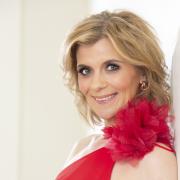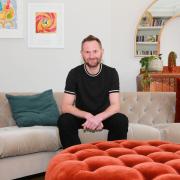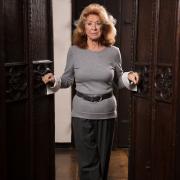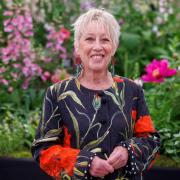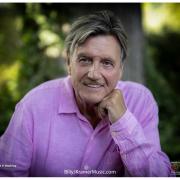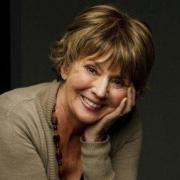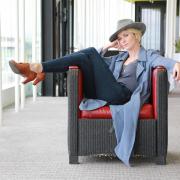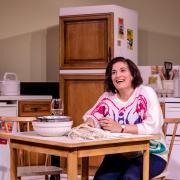Adventurer Simon Reeve is a self-confessed travel addict who’s spent the last two decades touring the world. To date, he’s visited over 120 countries, shining a light on underexposed stories in his popular documentaries and books, and was about to embark on a new series travelling the length of South America when lockdown was announced.
The ambitious trip was hastily aborted, and he returned home to Dartmoor where he lives with his wife Anya and their son, Jake, 10, and refocused his efforts on home soil, shooting a series in Cornwall last summer where he exposed the harsh reality of life in a county that’s romanticised.
Now he’s turned his attention to the Lake District, a region equally idealised, for a new three-part series for BBC Two.
‘Before the pandemic, the stamp I had on my forehead was ‘exotic foreign telly travel’ and I’m certainly not going to complain about that, but filming in Cornwall was a bit of a revelation for me and for my telly team because we discovered Brits aren’t all as tight-lipped and as controlled as we thought.
‘It turns out they do like sharing stories from their patch of the planet. Also, Brits are fascinating. I mean, what a bunch of eccentric nutters we are,’ says Simon, 49, who says he’s ‘camped, tramped and climbed in the Lakes but I’ve never put in anything like the miles or time into exploring like I’ve done for this series, and I hope those fresh eyes help.’
During the series, Simon meets an array of people living and working in the Lake District and wider Cumbria. He visits Barrow-in-Furness, an industrial town struggling with under investment and poverty, and Sellafield, the world’s largest nuclear processing facility that overlooks one of the biggest offshore wind farms in Europe.
‘It’s places and situations that aren’t often on the telly and perhaps people aren’t adequately aware of. I mean, I didn’t know about farming in the high fells, or Whitehaven, or Barrow, or the Cumbrian coast. It’s not supposed to be encyclopaedic, but I promise I’ve done it with love and respect, and hopefully it will show people different sides of an area that people think they know.’
He also embraces more typical tourist pursuits, such as climbing Scafell, England’s highest peak, and staying in the YHA Skiddaw Bunkhouse, one of the remotest hostels in Britain, but his favourite experience was sampling the icy pleasures of Buttermere with wild swimming advocate Sara Barnes, who also highlights the devastating impact of New Zealand Pygmyweed at Derwent Water.
‘My god, the team kept me in the water for ages to get all the different shots, but it was spectacular. Nothing’s really hidden in the Lakes, given it’s the second most visited tourist area in the UK after London (visited by 20 million people each year), but this isolated valley feels like one of the more hidden jewels,’ says Simon.
‘And actually, because of the size of the Lakes, (almost a thousand square miles), it means you can, quite quickly, get away from the hordes if you want, and find properly romantic visuals and situations. But I like being around people, so love being on the shores of Windermere with tourists enjoying their ice-creams.’
Whether he’s in Ravenglass or Rwanda, it’s imperative to him he’s surprised or shocked every day during filming.
‘If I’m not, then what we’re shooting isn’t strong enough quite frankly. I need to have my buttons tweaked and my preconceptions affected, definitely. That’s a really important part of the programmes. So, research goes on beforehand, sometimes for many months, but the interactions with people aren’t scripted. We just have to try and get the best we can out of every situation, so nobody’s time is wasted, least of all the viewers.’

Simon admits he has genuine moments of disbelief that he’s managed to carve a life of adventure and exploration, going so far as to claim: ‘I still feel I don’t deserve this life’.
‘Myself, and Jonathan, a cameraman I work with a lot, have literally pinched each other at times because we cannot believe we get to do this. What a privilege it is. We’ve lived several lives and that’s an incredible thing when lots of people feel tied to a certain life.
‘I’ve been lucky enough to step off in some ways and see different things and go to different places and have some spectacular experiences, I don’t take it for granted for a second, I promise you,’ says the presenter who grew up in Acton, west London.
In his 2018 autobiography, Step by Step, which detailed his formative years, Simon revealed he wasn’t born to a family of adventurers, and didn’t board a plane until he was an adult.
He had what he describes as a ‘chaotic youth,’ impacted by poor mental health.
He was rebellious, drinking too much and failing exams, and by the age of 17 found himself standing on a bridge staring “into the final abyss”, but he struggled on and slowly began to transform his life. He got a job in the post room of a newspaper where a curious mindset and can-do attitude was soon noticed, and he was promoted to researcher, and then writer, specialising in organised crime and terrorism.
He then spent five years writing his first book The New Jackals about Osama bin Laden and al-Qaeda, which was published in 1998, followed by further books and his television debut.
Simon’s latest tome, Journeys to Impossible Places, is a follow-up to Step by Step, and equally candid, including more tales from the road, as well as his personal struggles, such as the fertility problems he and Anya experienced before Jake arrived.
‘I hadn’t realised there was a value in sharing in life’s stories before I wrote the first volume. People reacted so warmly and so beautifully, so I had no hesitation sharing these stories of struggling to create a little bit of life myself because that was the biggest impossible journey of my recent existence, and I couldn’t really talk about my life without that.
‘Also, it helps people realise that someone you occasionally see gadding around on the telly, they might look like everything’s okay on the surface, but underneath it can be a challenge for all of us. Things go wrong and life is tricky, and the more people who know and share it, the better,’ adds Simon who admits he’s found the repetition and mundanity of life this past year-and-a-half challenging.
‘I’ve been quite stunned and horrified how quickly it’s gone in doing the same thing most days. It’s not that I want to make up for lost time, because I don’t feel I lost any but pushing yourself out of your comfort zone and doing lots of different things makes you feel more alive, frankly. I just want to crack on with living as much of a life as I possibly can, and share it with others as well.’
The Lakes with Simon Reeve airs on BBC Two in November
Journeys to Impossible Places by Simon Reeve, published by Hodder, is out now




